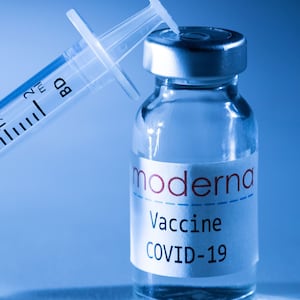Two vaccines for the novel coronavirus are potentially just days away from being approved for emergency use by the U.S. Food and Drug Administration, a massive step toward widespread distribution in a population with millions of sick patients.
But the vaccines aren’t just potential lifelines for a country stuck in the throes of a horrific pandemic. Instead, experts say, they could be pioneers for a new, potentially safer immunization technology, one that could change the way we battle future viral pandemics—and even illnesses like cancer.
Welcome to Rabbit Hole, where we dive deep on the biggest story. It’s for Beast Inside members only. Join up today.
Both vaccines—one from New York pharma Pfizer and another from Moderna, based in Massachusetts—are “messenger-RNA” vaccines. This brand-new technology works by introducing a genetically-engineered nanoparticle that encourages the production of coronavirus-fighting antibodies to the immune system.
As you may have heard by now, the nuances of this technology present challenges for storage and distribution. MRNA vaccines are delicate. They break down relatively quickly at room temperature. Safely shipping and storing them requires a “cold chain”—dry ice, coolers, refrigerator-trucks, and industrial freezers.
But there’s a silver lining to mRNA vaccines. The same technology that makes these vaccines so volatile in storage could also make them safer than older types of vaccine.
"RNA vaccines may be less likely to cause long-term unwanted effects,” David Ostrov, a University of Florida immunologist, told The Daily Beast.
Specifically, mRNA vaccines could be less allergenic, less toxic, and less prone to altering the user’s genome than non-RNA vaccines. That potentially means more people could get vaccinated with less long-term risk. For that reason, some experts expect mRNA vaccines to become more prominent in the future, despite the careful handling they require.
With emergency-use authorization from the FDA, Pfizer and Moderna could begin shipping doses of their respective vaccines before the end of the year, initiating a potentially years-long campaign to vaccinate hundreds of millions of Americans.
The EUAs hinge on initial data from both vaccines’ large-scale, phase-three trials that indicate both vaccines are around 95 percent effective. Both vaccines also appear to be safe in the short term, with the only notable side-effects being tenderness at the injection site, fever, and headaches.
Long-term safety is another matter. “Preliminary data are not final data,” Jennifer Reich, a University of Colorado sociologist who studies immunization, told The Daily Beast. It could take years to determine all the major side effects of a new vaccine.
But there are good reasons to be optimistic about mRNA vaccines. For starters, unlike many other vaccine types, these vaccines don’t include eggs. That’s good news for the roughly 1 percent of the U.S. population with an egg allergy.
Eggs and vaccines go way back. “Lots of viruses grow well on embryonated eggs,” Keith Jerome, a University of Washington virologist, told The Daily Beast. “In the early days of virology, it was the only way to grow viruses.”
Decades later, there’s a huge manufacturing base for growing viruses on eggs for the purpose of producing vaccines. Which is why, when you go to the pharmacy to get your annual flu shot, the pharmacist asks you if you’re allergic to eggs. “Since it works well for the great majority of people, there’s little incentive for manufacturers to prove newer methods would work and then build a new manufacturing infrastructure,” Jerome said.
But including eggs in a vaccine excludes millions of Americans from any mass vaccination effort. That’s not a problem with mRNA vaccines, which are purely man-made.
There are other benefits to excluding eggs, Philip Ralph Dormitzer, a Pfizer vice president and the company’s chief scientific officer of viral vaccines, told The Daily Beast. Mutations in the viruses in egg-based vaccines can make those vaccines less effective, he argued.
More broadly, “animal substrates” such as eggs are complex and thus hard to control during the production of a vaccine, Dormitzer added. MRNA technology promises to make lots of vaccines —not just coronavirus vaccines—more potent and easier to produce.
And potentially safer over time, too. The very quality that makes mRNA vaccines so hard to ship and store could also make them less toxic in the long term. “My guess is that toxicity for RNA vaccines will not be as significant as the old vaccines because RNA is extremely sensitive to degradation, which is why they need to be kept cold,” Ostrov explained. “So RNA vaccines may be less likely to cause long-term unwanted effects.”
“I believe this outweighs the logistical considerations, which are not trivial,” Elias Sayour, an associate professor of neurosurgery and pediatrics at the University of Florida, told The Daily Beast.
Likewise, RNA vaccines don’t include DNA, which other vaccine types do. So there’s no chance of the vaccine “infiltrating” a user’s own genome and causing nasty, long-term side effects.
“When considering gene-based vaccines, the instability of RNA in RNA-based vaccines does have a silver lining relative to the stability of DNA in DNA-based vaccines, if one is concerned about the theoretical risk of genome integration,” Dormitzer said.
All these unique qualities could make fragile, egg- and DNA-free mRNA vaccines the best option not only for the novel coronavirus, but other pathogens and diseases, as well.
“We are already starting to see mRNA replace other approaches in creation of cancer vaccines,” Sayour said.
Now we just have to hope these vaccines pan out.


